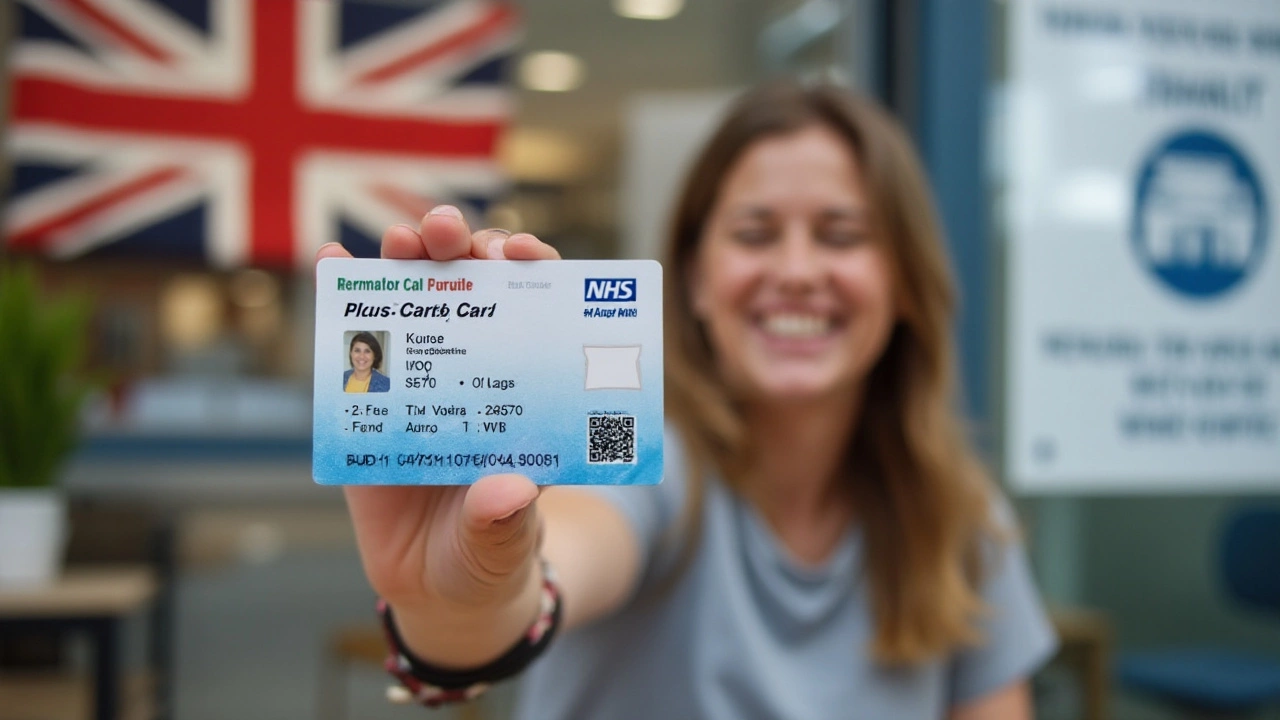 Jan, 5 2025
Jan, 5 2025
The UK’s healthcare system, known as the National Health Service (NHS), is renowned for providing medical services free at the point of use, but not everyone qualifies for free access. Understanding who is eligible can be tricky, and the rules often confuse newcomers and long-time residents alike.
While many people think it’s automatic upon arrival, securing free healthcare in the UK ties closely with residency status. In this article, we’ll dive into how long you need to reside in the UK to benefit from this significant social service.
We'll explore what makes someone eligible for free healthcare, and what exceptions exist for visitors and non-residents seeking medical attention. Whether you're planning a move to the UK or just curious about its healthcare workings, this guide offers clarity in a simple and approachable way.
- Understanding the NHS System
- Eligibility Criteria for Free Healthcare
- Residency Status and Its Impact
- Guidelines for Non-Residents and Visitors
Understanding the NHS System
The National Health Service, better known as the NHS, is one of the UK’s most cherished institutions, providing comprehensive healthcare funded through taxation. It was founded in 1948 with a simple principle: healthcare should be available to all, free at the point of delivery. The idea is revolutionary and contrasts sharply with healthcare systems elsewhere, particularly in countries like the United States, where health services are primarily private and can be costly without insurance. The NHS covers a wide range of services, from general practitioner (GP) visits and hospital care to dental, mental health, and even prescription services. It's structured into several different bodies across England, Scotland, Wales, and Northern Ireland, each with its own distinct nuances and funding structures.
One fascinating aspect of the NHS is its foundational belief in equality of access. This means that, regardless of financial status, everyone in the UK is entitled to the same level of care. As stated by Aneurin Bevan, the Minister of Health at the inception of the NHS,
“No society can legitimately call itself civilized if a sick person is denied medical aid because of lack of means.”This ethos still holds strong today, with the NHS revered as both a safety net and a mark of a compassionate society. There are ongoing debates around its funding and efficiency, given the increasing demands and costs associated with modern healthcare. Yet, it remains a cornerstone of British society and a critical subject of political discourse.
A critical factor in understanding the NHS is recognizing the balance it must strike between being a public service and a provider of comprehensive healthcare. While its services are free for those who qualify, the system does confront challenges concerning funding, waiting lists, and availability of services. Each regional NHS body attempts to address these issues uniquely. The NHS is funded by taxation, which means it gets a budget that the government allocates each year. This budget covers everything from staff salaries to the costs of medical treatments and equipment. Despite criticisms about waiting times and resource limitations, it remains immensely popular, with public satisfaction rates frequently cited as a testament to its importance. Curious individuals may look at statistics reported by NHS Digital, which tracks the performance and patient satisfaction, alongside internal audits that highlight areas of strength and needed improvement.
On another note, the NHS doesn’t exist in a vacuum and must constantly adapt to changing demographics and public health needs. This adaptability is particularly visible in its response to acute challenges like pandemics or emerging medical technologies, where the NHS must quickly innovate to stay abreast of current developments. Despite the pressures, it manages to deliver commendable care standards. It also fosters research and collaboration globally, contributing to an array of medical advances and public health initiatives. The essence of the NHS is not static; it is an evolving entity striving to balance traditional healthcare provision with the advances in medical science and technology, underscoring its historical significance and ongoing relevance.

Eligibility Criteria for Free Healthcare
Understanding who can access free healthcare in the UK requires demystifying a few key points about the nation's beloved National Health Service (NHS). While many people assume that stepping foot on British soil grants instant healthcare access, the reality is more nuanced. The concept of 'ordinary residence' is central to determining eligibility. What does this mean exactly? In short, it's not just about living in the UK, but more about settling down with a proper intent to stay. Whether you're a UK citizen returning from a stint abroad or a newcomer excited to plant roots, knowing how to navigate these criteria can be the key to unlocking these services.
The NHS bases its eligibility guidelines largely on residency status as opposed to mere nationality. British citizens, residents with indefinite leave to remain, and nationals from European Economic Area countries typically enjoy seamless access. However, those on work visas or student permits must demonstrate their commitment to residing in the UK. Isn't it interesting how a healthcare system assesses personal intent? This can involve showing rental agreements, utility bills, or other documents portraying life integration. This also serves as a reminder of how interconnected our personal and bureaucratic lives have become, right?
"The NHS is one of the world's largest publicly funded health services, yet ensuring access to everyone fairly is its persistent challenge," says Margaret Chan, former head of the World Health Organization.
But what about those just passing through, you ask? Visitors and short-term travelers might face limitations. Emergency services are more inclusive, but routine care may come with a price tag. Navigating this landscape requires understanding what services are considered exigent – these include emergency room visits or treatment for life-threatening conditions. Anything beyond can involve out-of-pocket expenses unless covered by travel insurance.
Additional criteria apply depending on the region within the UK. For instance, Wales and Scotland may offer slight variances in their healthcare provisions compared to England. Hence, knowing the specifics can influence where prospective residents decide to settle. Lists of NHS trusts and their criteria are often made available publicly, but the rules can be elusive, and sometimes the devil is indeed in the details. To make life easier, checking local healthcare guidelines is always a prudent first step when moving to any part of the UK.
There are scenarios where the eligibility lines blur. Diplomatic personnel or members of the armed forces residing in the UK might wonder about their entitlements. The NHS extends a warm welcome here, offering comprehensive access due to international agreements and national service contributions. It’s a prime example of diplomacy and healthcare policy intersecting to shape equitable access across diverse populations.

Residency Status and Its Impact
Your residency status in the UK plays a significant role in determining your entitlement to free healthcare. This doesn't solely depend on the length of time you have lived in the UK but involves a complex mix of factors that make up your residency status. Whether you are settled in the country as a student, an employee, or a family member, each status has unique implications for your healthcare rights. Generally, those who make their home in the UK can access treatment through the NHS without charge, but the specifics can get tangled.
To be considered an ordinarily resident, you must prove that you are living in the UK voluntarily and for a settled purpose. This doesn't necessarily mean you need citizenship or specific immigration status, but having these can certainly help in establishing your claim. NHS eligibility hinges on your ability to show a connection to the UK that is not merely temporary. Applications for healthcare usually require various documentation, like proof of address, visas, or employment contracts, which help clarify your intent to remain.
Another factor influencing your access to free healthcare is the residency requirement itself. The NHS usually stipulates a period, often around six months, as a reasonable threshold to determine your eligibility. This can shift slightly depending on the sector or service used, but the principle remains the same. Meanwhile, non-residents or those not ordinarily residing face different charges, and it’s vital they understand these to avoid unexpected bills.
According to an NHS handbook, "Those living in the UK for under six months may have to pay for treatment." Thus, comprehending these distinctions is essential, especially for new immigrants or temporary workers. If your stay revolves primarily around temporary work assignments, it might be worth exploring private healthcare insurance options to mitigate any unexpected costs.
Residency rules map a clear distinction between temporary visitors and settled residents. Visitors from certain countries, like those in the EU, enjoy reciprocal agreements that might lower costs or offer limited access; however, post-Brexit changes mean even these merits could become nuanced. Moreover, students studying in the UK might find that their healthcare access differs. If their courses exceed six months, they might be eligible as ordinarily resident, provided they meet additional conditions such as visa status.
It's crucial to note that the NHS requires constant revisions and updates to its residency criteria. Therefore, potential residents are encouraged to stay up-to-date with the latest guidelines. In some instances, governments issue exceptions or temporary relaxations, particularly during public health crises or humanitarian disasters, allowing different interpretations of residency. Keep an eye on the NHS and government websites for the most accurate and timely information.

Guidelines for Non-Residents and Visitors
Non-residents and visitors arriving in the UK might find themselves in need of medical services during their stay. Unlike residents who enjoy comprehensive healthcare under the National Health Service (NHS), non-residents often face a different scenario. Understanding the distinction between emergency and routine care access can save visitors from unexpected financial burdens. While emergency services at hospitals are free, other treatments might incur charges unless there's an existing reciprocal healthcare agreement with the visitor's home country.
Visitors should be aware that the UK has reciprocal healthcare arrangements with several countries. These agreements allow visitors access to certain healthcare services, similar to locals. For example, EU citizens can use a European Health Insurance Card (EHIC) or its post-Brexit replacement, the Global Health Insurance Card (GHIC), to cover some medical costs during temporary visits. Such arrangements underscore the importance of checking whether your home country has a similar understanding with the UK before traveling.
Travelling without proper medical cover is risky. Preparing by getting travel insurance that includes healthcare can safeguard against unforeseen medical expenses. Many travelers overlook this in their itineraries, thinking their trip will be smooth. However, accidents happen, and being prepared is key to ensuring a safe journey. A comprehensive policy will often cover both emergency and elective treatments, providing peace of mind and avoiding steep NHS charges.
According to a report by the UK government, visitors are responsible for paying NHS hospitals upfront for any treatment they receive. This rule applies to planned treatments and is strictly enforced. Any unpaid fees might affect future travel to the UK. If you're visiting family or for tourism, budgeting for potential healthcare costs should factor into your financial planning. This is crucial for avoiding unexpected disruptions during your visit.
"Having travel insurance is as essential as your passport," advises the Association of British Insurers. "Unexpected crises can arise, and dealing with them in a foreign country is never straightforward without proper coverage."
Embassies can sometimes assist visitors in liaising with NHS services, particularly in emergencies. They offer a vital line of communication and can often mediate any misunderstandings about medical billing or service access. Whether it's a sudden illness or the need to refill a prescription, reaching out to your embassy can simplify these potentially stressful situations.
Non-residents and visitors to the UK should prepare and familiarize themselves with the healthcare landscape to ensure a smooth visit. Awareness of the NHS's function and having suitable insurance can transform an overwhelming experience into a manageable one. Taking the time to plan ahead will help protect both health and finances, making the visit enjoyable, enriching, and, above all, safe.
